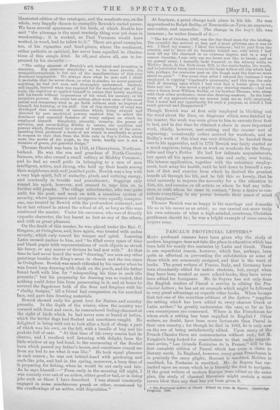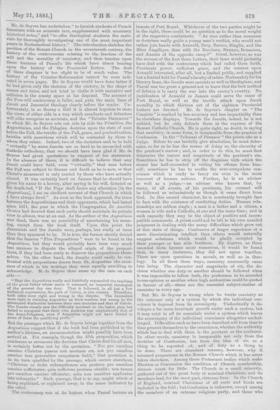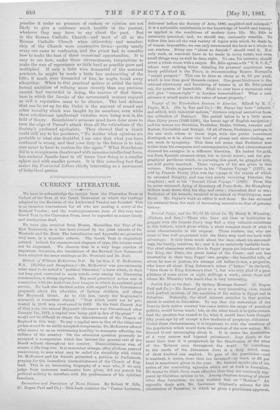PASCAL'S PROVINCIAL LETTERS.*
MANY profound reasons have been given why the study of modern languages does not take the place in education which has been held for nearly five centuries by Latin and Greek. There is one superficial reason, however, which has, perhaps, been quite as effectual in preventing the substitution as some of those which are commonly assigned, and that is the want of books. The great writers of France, Italy, and Germany have been abundantly edited for native students, but, except when they have been treated as more school-books, they have never been edited for foreigners. Mr. do Soyres has not only done the English readers of Pascal a service in editing the Pro- vincial Letters ; he has set an example which might be followed to very great advantage as regards other books. When he says that not one of the countless editions of the Letters " supplies the setting which has been added to every obscure Greek or Latin author," he greatly understates the case, so far as his own countrymen are concerned. Where is the Frenchman for whom such a setting has been supplied in English P Other writers, no doubt, have been more fortnn ate than Pascal in their own country ; for though he died in 1662, he is only now on the eve of being satisfactorily edited. Upon many of the French Classics there are commentaries without end ; but M. Faugbre's long looked-for contribution to that really magnifi- cent series, " Les Grands Ecrivains do la France," will be the first complete edition of Pascal which has even a claim to literary merit. In England, however, every great Frenchman is in precisely the same plight; Bossuet is unedited, Molis)re is unedited, La Fontaine is unedited. Mr. de Soyres has em- barked upon an ocean which he is literally the first to navigate. If the groat writers of modern Europe were edited on the same plan, the study of classical literature might sustain a more severe blow than any that has yet been given it.
The Provincial Letters of Paeoal. Edited by John de Soyres. Cambridge Doighton. 1850. Mr. de Soyres has undertaken " to furnish students of French literature with an accurate text, supplemented with necessary
historical notes," and "to offer theological students the mate- rials for thoroughly investigating one of the most important Pages in Ecclesiastical history." The introduction sketches the position of the Roman Church in the seventeenth century, the history of the controversies relating to the freedom of the will and the morality of casuistry, and then touches upon those features of Pascal's life which have direct bearing upon the history of the Provincial Letters. The first of these chapters is too slight to be of much value. The history of the Counter-Reformation cannot be even indi- cated in seven pages. Mr. de Soyres would have done better if he had given only the skeleton of the century, in the shape of tames and dates, and not tried to clothe it with narrative and criticism in the scanty space at his disposal. The account of the Free-will controversy is fuller, and puts the main lines of Jesuit and Jansenist theology clearly before the reader. Un- fortunately, in so thorny a field it is almost hopeless to state the views of either side in a way which assailants and defenders will alike recognise as accurate, and the "Tabular Statement" in which Mr. de Soyres sets out side by side the Primitive, the Augustinian, and the Pelagian doctrine upon the state of man before the Fall, the results of the Fall, grace, and predestination, bristles with assertions which will be contested by those to whom they relate. Indeed, two of the doctrines said to be held " virtually " by some Jesuits are so hard to be reconciled with Clatholie orthodoxy, that we should have been glad if Mr. de Soyres had given quotations in support of his statement. In the absence of these, it is difficult to believe that any Jesuit could have held, even " virtually," that man before the Fall was subject to disease and death as he is now, or that Christ's atonement is only needed by those who have actually sinned. It was certainly hard on Jansen that lie should have given his name to a heresy, after saying in his will, dictated on his death-bed, "If the Pope shall desire any alteration [in the Augustinus], I am an obedient servant of that Church in which I have always lived." As soon as the book appeared, the truce between the Augustinians and their opponents, which had lasted since 1611, the year in which the Congregation De Ana;ails Oratice had decreed. that each party should maintain its private 'view in silence, was at an end. As the author of the Augustinus was dead, there was no possibility of ascertaining his mean- ing, except from the book itself. Upon this point the Jansenists and the Jesuits were, perhaps, less really at issue than they appeared to be. It is true, the former stoutly denied
that the famous "Five Propositions" were to be found. in the August/was, but they would probably have been very much less anxious to dispute the alleged origin of the proposi- tions, if they had been ready to disavow the propositions them- selves. On the other hand, the Jesuits could easily be con- fronted with propositions drawn from St. Augustine the exist- once of which in his writings they were equally unwilling to
acknowledge. M. do Soyres thus sums up the case on each aide :—
" That the Augustinus really and faithfully expounded the teaching of the groat father whose name it assumed, no impartial theologian of the present day can deny. That it followed, in all but a few technical expressions, the path of Calvin, is also certain. Therefore, moth sides were right and wrong in the dispute. The Jansenists were right in claiming Augustine as their teacher, but wrong iu the attempted distinction between their own doctrine and that of Calvin. The Jesuits clearly saw the difficulty involved in tho latter plea, but failed to recognise that their own position was emphatically that of the Somi-Polagitins, oven if Augustine might not have denied to Some of them the qualifying prefix."
But the passages which Mr. de Soyres brings together from the Augustinus suggest that if the book had been published in the author's lifetime, an accommodation might possibly have been arrived at. For example, though the fifth proposition, which condemns as erroneous the doctrine that Christ died for all men, is certainly borne out by the quotation, "Nee pro omnibus orrinino Christus passus out niortuus est, ant pro omnibus ornnino tam genoraliter sanguinem luta," that quotation is in its turn qualified by the passage, which occurs elsewhere, " Christus so dedit redemptionem sou pretium pro omnibus oninino sufficienter, quia sufficiens pretium obtulit ; non tamen
pro omnibus omnino efficienter, quia non omnibus applicatur ista redemptio." Each passage, that is to say, might admit of
being explained, or explained away, in the sense indicated by the other.
The controversy was at its hottest when Pascal became an
inmate of Port Royal. Whichever of the two parties might be in the right, there could be no question as to the moral weight of the respective combatants. "As mon rather than measures or doctrines really guide a young man's verdict, who would not rather join hands with Arnauld, Sacy, Barons, Singlin, and the Mare Ang6lique, than with the Escobars, Baunys, 13risaciers, and Aunats of the opposite camp P" Great, however, as was the success of the first three Letters, their fame would probably have died with the controversy which had called them forth. Proximate power, sufficient grace, and the censure upon Arnauld interested, after all, but a limited public, and supplied. but a limited field for Pascal's faculty of satire. Fortunately for his literary fame, the Jesuits were casuists as well as theologians, and Pascal was too great a general not to know that the best method. of defence is to carry the war into the enemy's country. No justification of Arnauld or Jansen could. serve the cause of Port Royal, so well as the terrific attack upon. Jesuit morality to which thirteen out of the eighteen Provincial Letters are devoted. Mr. do Soyres's chapter on " The Casuists " is marked by less accuracy and less impartiality than he elsewhere displays. Towards the Jesuits, indeed, he is not unkind, but he only defends them at the expense of the Roman Catholic Church. He is quite right, no doubt, in saying that casuistry, in some form, is inseparable from the practice of Confession. In the "Tribunal of Penance " the priest sits as a Judge. Before ho can lawfully give absolution, he must deter- mine, so far as he has the means of doing so, the sincerity of the penitent's sorrow ; and, in order to do this, ho must first determine the nature and magnitude of the penitent's sin. Sometimes he has to strip oil' the disguises with which the sinner has half-succeeded in veiling his offence from him- self; sometimes he has to soothe the over-scrupulous con- science which is ready to fancy sin even in the most innocent of human actions. Further, he is an adviser as well as a judge,— an adviser who knows that, by many, at all events, of his penitents, his counsel will be followed as submissively as though it came direct from God. In this second character, he is constantly brought face to face with the existence of conflicting duties. Human rela- tionships are seldom single ; a man is a father and a citizen, a woman is wife and a Catholic, at one and the same time ; and in each capacity they may be the object of positive and incom- patible commands. A priest could not be left to his own unaided judgment in dealing with the many difficulties which grow out of this state of things. Confessors of larger experience or a more discriminating intellect than others would. naturally suggest solutions which would be gladly accepted by their younger or less able brethren. By degrees, as these recorded dicta became more numerous, it would be found that, in many instances, they did not agree together. There are open questions in morals, as well as in thoo• logy. In all these three ways, casuistry necessarily came into being. The character and magnitude of sin, the de- cision whether one duty or another should be followed. when it was impossible to follow both, the preference to be accorded. to one opinion or another when high authorities could be quoted. in favour of all,—these are the essential subject-matter of casuistry in every age.
But Mr. de Soyres is wrong when he treats casuistry as the outcome only of a system by which the individual con- science is deposed from its sovereignty. Undoubtedly it de- velopes a far more luxuriant growth under such a system, but it may exist in all its essentials under a system which leaves the sovereignty of the individual conscience altogether unchal- lenged. Difficulties such as have been described will from time to time present themselves to the conscience, whether the authority which has to deal with them is the penitent or the confessor. In other words, casuistry is inseparable not only from the doctrine of Confession, but from the idea of sin as a thing to be repented of, and of duty as a thing to be done. There are abundant reasons, however, why it assumed proportions in the Roman Church which it has never taken elsewhere. Among those Protestant bodies which make Election or Conversion the condition of Church membership, sinners count for little. The Church is a small minority, gathered out of the great body of nominal Christians, and its members lead, for the most part, virtuous lives. In the Church • of England, nominal Christians of all sorts and kinds are included in the fold ; but Confession is unknown, except among the members of an extreme religious party, and those who practise it under no pressure of custom or opinion are not likely to give a confessor much trouble in the present, whatever they may have to say about the past. But in the Roman Catholic Church—and most of all in the Roman Catholic Church when citizenship and member- ship of the Church were coextensive terms—pretty nearly every one came to confession, and the priest had to consider how to make the best of these occasional opportunities. It is easy to see how, under these circumstances, temptations to make the way of repentance as little hard as possible grew and multiplied. If only a little were demanded of the nominal penitent, he might be made a little less undeserving of the title; if much were demanded of him, he might break away altogether. When to this practical motive is added the intel- lectual ambition of refining more cleverly than any previous casuist had succeeded in doing, the sources of that litera- ture in which the Jesuits of the seventeenth century enjoyed so evil a reputation cease to be obscure. The best defence that can be set up for the Order is the amount of sound and sober morality which was taught by its members, even while these mischievous intellectual victories were being won in the field of theory. Bourdaloue's sermons must have done more to turn the edge of Pascal's attack than all the refutations of the Society's professed apologists. They showed that a Jesuit could still say to his penitents, " No matter what opinions are probable or what sins doubtful, I am sure that what you have confessed is wrong, and that your duty in the future is to take care never to have to confess the like again." What Bourdaloue did in a conspicuous theatre and with immense intellectual force, less eminent Jesuits have iu all times been doing in a smaller sphere and with smaller powers. It is this consoling fact that makes the Provincial Letters chiefly interesting as a monument of individual genius.




































 Previous page
Previous page